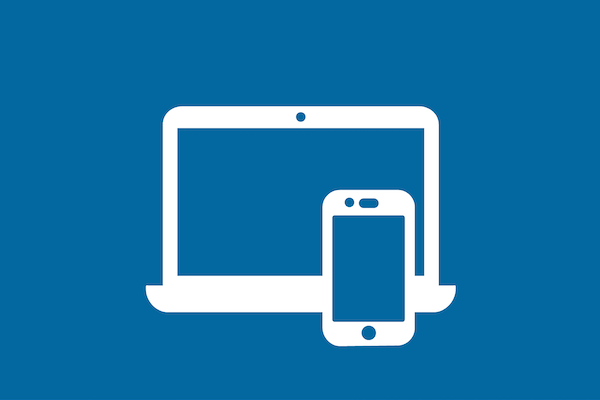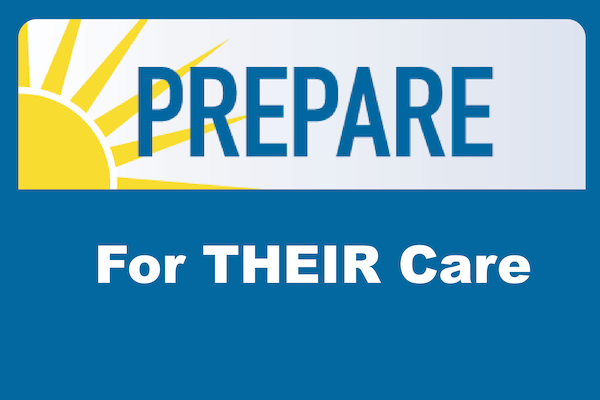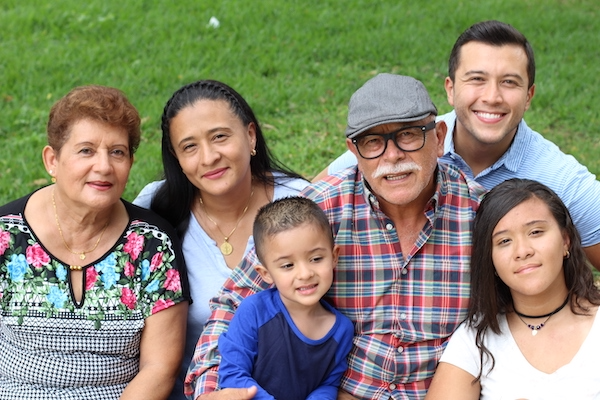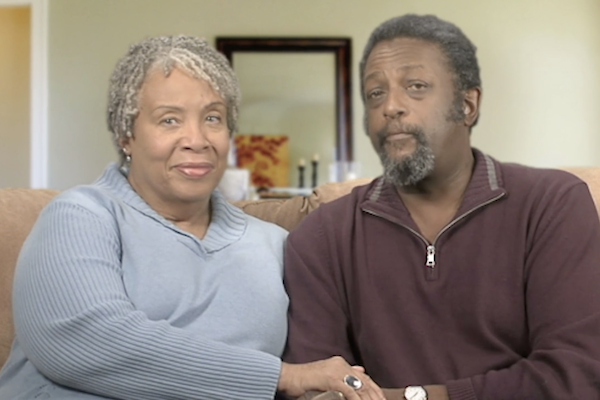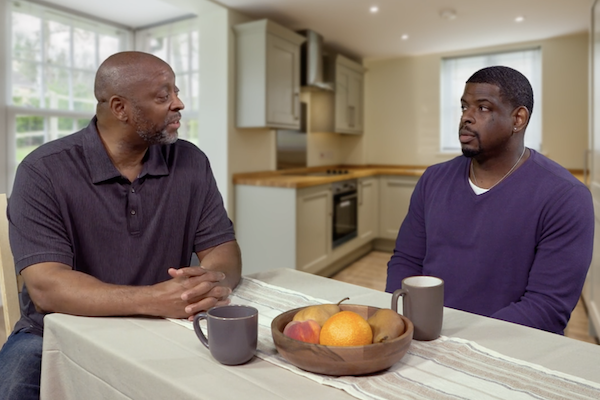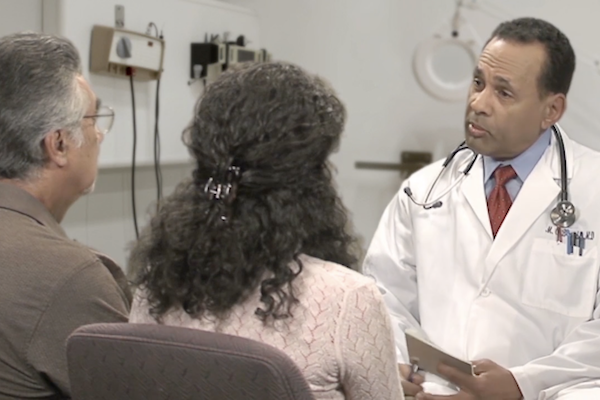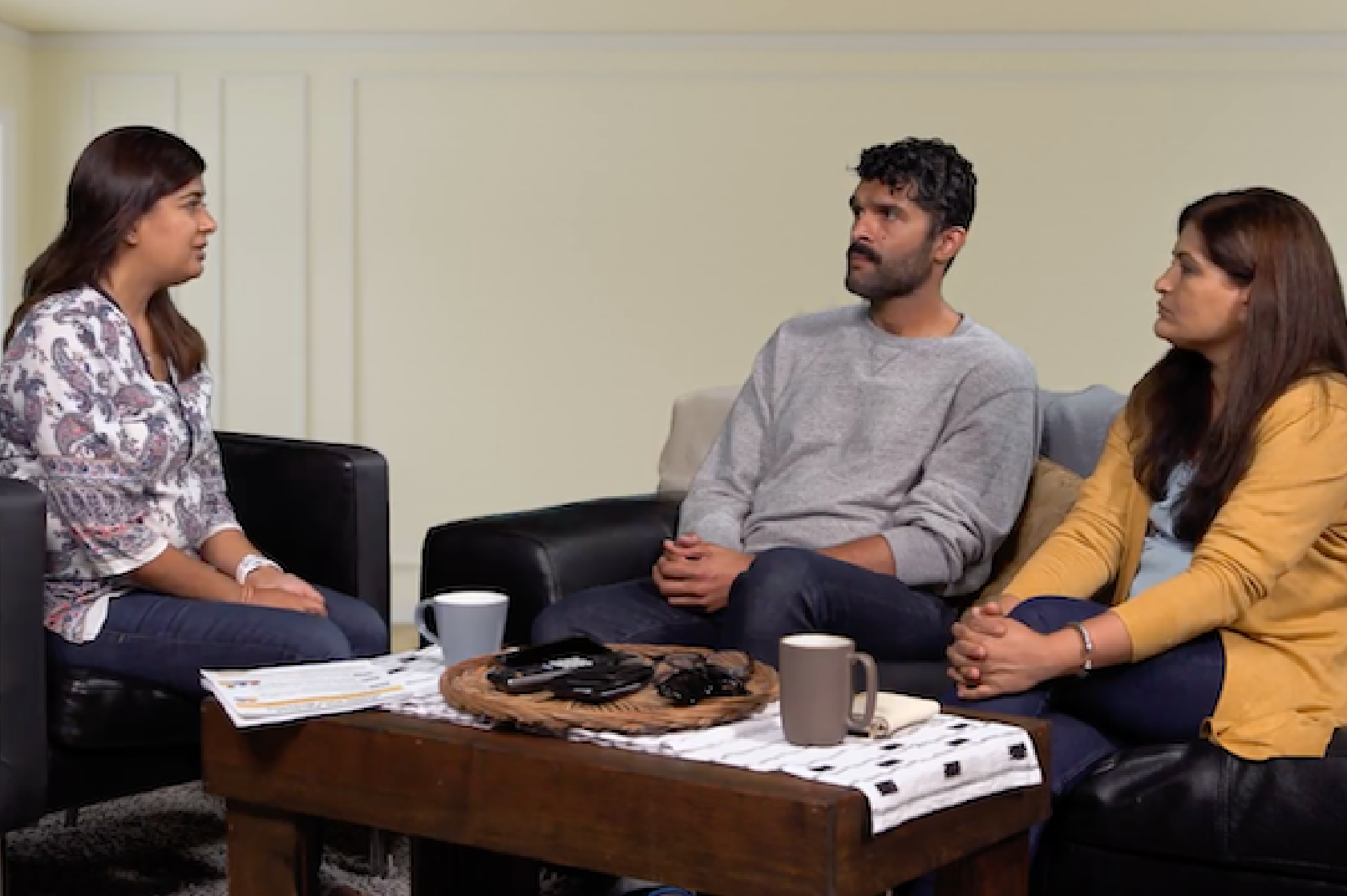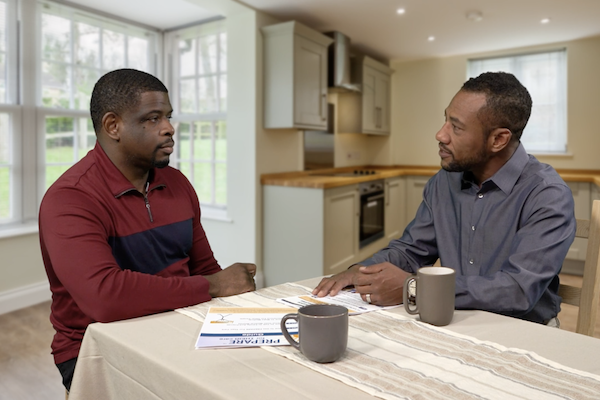Click on the topic that would be most helpful for you.
Click on the topic that would be most helpful for you.
How To Use the PREPARE for THEIR Care Program.
And, How Other PREPARE Tools Can Make It Easier To Help Your Family and Friends With Their OWN Medical Planning.
PREPARE for THEIR care, the program you are watching now, is actually one of several programs that are part of the LARGER, overarching PREPARE program.
The PREPARE for THEIR Care program can be found on this main PREPARE homepage.
PREPARE for THEIR Care is designed to Help Other People .
People can click here to learn how to Help OTHER PEOPLE with their medical planning and decisions.
Notice, that when you hover over the button you are about to click on, it will be outlined in orange.
The main PREPARE homepage also has other resources, including PREPARE for YOUR Care, which can help your family and friends do their own medical planning.
Later on, in this video, we will come back to show how using PREPARE for YOUR Care can make it MUCH easier to help your family and friends with their OWN medical planning.
Now, let’s get back to learning how to use the PREPARE for THEIR Care program.
If you click on PREPARE for THEIR Care, it will take you to the PREPARE for THEIR Care homepage like this, PREPARE for THEIR Care will support you as you help other people with their medical planning and medical decisions.
You Will See Stories About All Kinds of People and Decisions.
The stories you will see in the videos can help, even if your situation may be different.
It Is OK if These Topics Are New to You.
PREPARE for THEIR Care will walk you through it, step-by-step.
The video stories will also show you what to say.
And, if it makes it easier, you can even watch the videos with your family and friends.
Now, let’s review how to use the program.
On the home page…
You can click on the topic that would be most helpful to you.
Or, you can scroll down to see all PREPARE for their care content.
There are 3 main topics.
The video you are watching now is part of the section called How To Use This Program and About Medical Planning.
The program also includes information about How to Help Other People With Their Medical Planning.
This section can be used when people can still speak for themselves.
And finally, this program has information about How to Make Medical Decisions for Other People.
This section can be used when people cannot, or do not want to, speak for themselves.
You can get to all the information in the program by scrolling up and down on the webpage like this.
Or, you can click on these buttons at the top of the homepage.
For example, if you were to click on How To Help Other People With Their Medical Planning, it will bring you down to that part of the webpage without needing to scroll like this.
You will see that each section has brief videos.
You can watch the videos in order.
Or, you can watch only the videos that fit your needs.
There are even some extra bonus videos you can watch if they are helpful to you.
If you want to go back up to the top of the homepage without scrolling, you can click on this button that says “top”.
You will notice that as you scroll up and down, the top button stays in the same place on the screen so you can always find it.
Let’s click on the top button and go back up to the top of the homepage.
Finally, the homepage also has a Program Guide.
This guide can be used on its own or can be used to follow along with the videos.
To learn more about other resources click on “How to Use this program and about medical planning”.
Here you can learn more about medical planning and about advance directive forms.
You can also click on the “More Information” button.
In the pop-up window click here to see a list of terms used in the program, here to see Frequently asked questions or “F. A. Qs”, here to see other resources for decision makers and caregivers, here to see a brief video about How a special medical service called Palliative Care Can Help
Let’s scroll back up to the top of the homepage.
If you are interested in how to help other people with their medical planning, there are some additional resources that can make this easier for you.
These resources can be found on the main PREPARE homepage.
If you click on this yellow bar at the top of the page that says “click here to go to PREPARE home” this will take you back to the main PREPARE homepage like this.
Earlier in this video we mentioned another resource on the main PREPARE homepage called PREPARE for YOUR Care.
This program helps people have a voice in their medical care and walks them step-by-step through their OWN medical planning.
So, if your family and friends use PREPARE for YOUR care, it will be MUCH easier for them to do their OWN medical planning and also MUCH easier for you to help them with the process.
Clicking on PREPARE for YOUR Care will take you to the PREPARE for YOUR Care homepage.
PREPARE for YOUR Care is a step-by-step program with video stories that will walk your family and friends through their own medical planning.
To start the program your family and friends can click this blue button that says “Click here to start PREPARE”, or, they can click on the “PREPARE 5 steps” in the menu and go to the steps that are right for them, such as, Step 1, “Choose a medical decision maker”, or Step 2, “Decide what matters most in life”, or Step 5, “Ask doctors the right questions.”
PREPARE for YOUR care also provides easy-to-read, legally valid advance directive forms for all U.S. states that your family and friends can download and print for free.
Your family and friends can get to the forms by either clicking on the word “advance directive” in the blue tool bar, or, by scrolling down on the home page here and clicking the button that says “Get the PREPARE Advance Directive”
As your family and friends are going through the PREPARE for YOUR Care program, it will ask them questions about their wishes for medical care.
If people want, answers to these questions can be copied onto the easy-to-read prepare advance directive form.
What is SO great about PREPARE for YOUR Care is that you do not have to be an expert to help your family and friends.
PREPARE for YOUR Care provides all the information your family and friends need for medical planning.
This way, you do not have to guess what to say.
PREPARE for YOUR Care will say it for you.
Viewing PREPARE for YOUR Care
Your family and friends can go through the program on their own.
Or, you can go through it together in person, over the phone, on a video call, or with the family as a group.
To learn how to tell your family and friends about this resource , on the PREPARE for THEIR Care homepage under the section, how to help other people with their medical planning.
Click on the video called “How to Ask Other People About Their Medical Wishes”.
How to use the PREPARE for THEIR Care program.
And, how other PREPARE tools can make it easier for you to help your family and friends with their OWN medical planning.
In This Video You Will Learn: About Medical Planning
Medical Planning
Medical Planning helps people have a voice in their own health care.
Sometimes medical planning is also called Advance Care Planning
Medical Planning Allows People To:
Name a trusted medical decision maker in case of an emergency.
People can also name a back-up person(s) in case the first medical decision maker is not able to do it.
They can also ask these people to make decisions as a group.
Medical Planning Also Allows People To:
Tell their medical decision maker(s) and medical care team what is most important for their quality of life and their healthcare.
Medical Planning Also Allows People To:
Write down the name of their medical decision maker and medical wishes on an advance directive form.
To learn More about advance directives, go to the section called “Learn How to Use This Program” and “About Medical Planning” and see the video called “About Advanced Directive Forms”.
It Is Important To Plan Ahead.
Many people will need someone else to make medical decisions for them in the future due to:
If an emergency happens, you may be asked to help make decisions for your family member or friend.
Some Medical Decisions That May Need To Be Made.
You may be asked to make decisions about:
Life support treatments such as:
And, what happens to someone’s body and organs after they die.
It Is Important To Plan Ahead.
To honor someone’s medical wishes, you need to know what is important to them and important for their quality of life.
Talking now can help prevent stress if you need to make medical decisions for someone in the future.
To learn how to help other people with their medical planning you can watch those videos on the PREPARE for THEIR care homepage.
In This Video You Learned:
About Medical Planning
In This Video You Will Learn:
About Advance Directive Forms and Other Forms for Medical Planning.
Hospitals and Clinics May Use Different Forms for Medical Planning.
These Forms May Include:
Let’s start with Advance Directives .
Advance Directives are legal forms that let people have a say about how they want to be cared for if they cannot speak for themselves.
They also allow people to write down the name of a medical decision maker(s) as well as their medical wishes.
To get the prepare easy-to-read advance directives you can scroll down to the bottom of the PREPARE for THEIR care homepage and click on this button.
PREPARE Advance Directives Are Free and Easy-To-Use.
They focus on quality of life and what brings life meaning.
And, they have space for people to write down what is most important for their quality of life.
The PREPARE Program Has Videos and Other Information To Help People Fill Out the Form.
People Can Also Download a Blank Form To Do Outside of the Website.
Now let’s talk about a Durable Power of Attorney for Health Care Form.
This form only allows people to write down the name of a medical decision maker(s) (not their medical wishes)
Next, we will talk about Living Will Forms.
This form only allows people to write down their medical wishes (not medical decision makers).
Finally, we will talk about a Form That Only Medical Providers Can Sign.
It’s called Physician Orders for Life-Sustaining Treatment – “POLST”.
The form may have different names in other states, such as “MOLST” or “MOST”.
The POLST Form allows medical providers to sign an order for people’s end-of-life medical procedures, such as CPR or a breathing machine.
It is used for people with very serious illness or at the end of life.
This form is only about medical end-of-life medical procedures.
It does not include medical decision makers.
Remember That All Forms Must Be Signed.
Forms People Can Sign:
Finally, Forms that ONLY Medical Providers Can Sign:
Each US state has their own laws about who needs to sign the form.
For most states, people need to sign in pen.
Some states allow people to sign online.
Please read each form carefully.
Review the Forms Over Time.
People’s lives change and their health may change too.
Review the forms every year or so to make sure they are most up to date.
It is also a good idea to review the forms if someone goes to the hospital or their health changes.
Remember That People Are Different
Some people may never want to write down their medical wishes.
This is OK.
You may be just planting the first seed.
Talking about their wishes with them can still help.
To learn how to help other people with their medical planning you can watch those videos on the PREPARE for THEIR care homepage.
In This Video You Learned:
About Advance Directive Forms and Other Forms for Medical Planning.
In This Video You Will Learn:
Important Ways Medical Planning Is Different for Each Person.
To Learn More About Medical Planning please click on “How to Use This Program” and “About Medical Planning” on the homepage.
Important Ways People May Differ.
Your Family and Friends May Differ In:
How ready they are to talk about or write down their medical wishes.
How they make medical decisions.
And, who they choose as medical decision makers,
Let’s first talk about readiness.
It Is OK if Someone Is Not Ready To Talk About Their Medical Wishes.
You may be just planting the first seed.
And, you may be able to come back and talk about it later.
It Is Also OK if Someone Is Not Ready To Write Down Their Medical Wishes.
Talking about their wishes with them can still help.
Some People May Never Be Ready.
Just showing your support can be helpful.
They may change their mind in the future.
Words You Can Say When Someone Is Not Ready
“I understand. There is no pressure.”
“I care about you. And, if there was ever an emergency, I would want to be able to honor what is important to you.”
“When you want to talk about it, I will be here to listen.”
People Also Differ in How They Make Medical Decisions.
People come from different family backgrounds and cultures.
For this reason, some people want to make all their own medical decisions.
And some people do not want to make any of their own medical decisions.
They may want someone else to make medical decisions for them, even if they can still speak for themselves.
Even so, they may still be willing to give you advice about how best to care for them.
And, Some People May Make Medical Decisions That Differ From What You Think Is Best.
This can happen.
But it is important to honor that person’s wishes, even if they differ from your own.
People Also Differ in Who They Want As Their Medical Decision Maker(s).
These decisions can be based on:
People Also Differ in How Decisions Should Be Made
If they cannot speak for themselves:
When Making Decisions as a Group
It is good to decide on ONE spokesperson to speak to the medical providers for the group.
It is also important for the group to talk ahead of time, so everyone knows their role and agrees.
Sometimes Groups and Families Do Not Agree
If this happens, it is OK to ask the medical care team to talk with the group.
It is also OK to ask to speak with the Palliative Care team at the hospital or clinic.
The Palliative Care Team
Palliative Care medical providers have special training to provide an extra layer of support for people at any age being treated for serious illness.
The team treats pain and other symptoms at the same time people are getting other medical care to treat their serious illness.
The team also helps people decide on the medical care that is right for them.
They support both patients and caregivers when making medical decisions.
And, they support families when making decisions together.
To learn more about palliative care, click on the button on the homepage that says “More Information”.
There, you can watch a brief video called “How Palliative Care Can Help”.
You May Also Learn:
That you are not the medical decision maker, when you thought you might be.
And, that being someone’s medical decision maker may not be right for you.
To learn more in the section called “How To Help Other People With Their Medical Planning” see these bonus videos called “What To Say If You Learn You Are Not The Decision Maker” and, “What To Say If You Do Not Want To Be The Decision Maker”.
In This Video You Learned:
Important Ways Medical Planning Is Different for Each Person.
In This Video You Will Learn:
How To Bring Up the Topic of Medical Planning With Your Family and Friends:
To Learn More About Medical Planning
Click on “How to Use this program and about medical planning”.
Here you can learn more about medical planning and about advance directive forms.
Let’s start with How To Bring Up Medical Planning in General.
Here are some tips that may help when bringing it up:
Words You Can Say
“I was hoping to talk with you for a few minutes. Is now a good time?”
“I’ve been thinking. If something were to happen and you could not speak for yourself, the doctors may turn to me.”
“If they do, I really want to be prepared to tell them what is most important to you.”
“I could really use your help.”
You Can Also Talk About Prior Experiences.
“Remember that movie we watched (or what happened to our family member)?”
“It got me thinking about what is important for my own health in case of an emergency.”
“I really want to know what is important to you too.”
This Next Video Will Show You How To Bring Up Medical Planning in General
This is one example.
Your situation may be different.
*See video at 1:37 to 2:28 on the video timeline
How To Bring Up Medical Planning if Someone Has a Serious Illness.
It can be hard to know what to say.
Words You Can Say When Someone Has a Serious Illness
“I’ve been thinking of ways that I can support you.”
“If you were ever unable to speak for yourself, I would be willing to talk to the doctors on your behalf.”
“I am talking with you now because I want to be sure that I would be doing what you would want. Can we talk about this?”
This Next Video Shows How To Bring Up Medical Planning if Someone Has a Serious Illness
This is one example.
Your situation may be different.
*See video at 3:52 to 5:28 on the video timeline
And finally, we will talk about How To Bring Up Medical Planning When Someone Is Not Ready.
It is OK if someone is not ready.
You may be just planting the first seed.
And, you may be able to come back and talk about it later.
Some People May Never Be Ready.
It is OK if people do not want to talk about or write down their medical wishes.
Just showing your support can be helpful.
They may change their mind in the future.
Words You Can Say When Someone is Not Ready
“I understand. There is no pressure.”
“I care about you. And, if there was ever an emergency, I would want to be able to honor what is important to you.”
“When you want to talk about it, I will be here to listen.”
In This Video You Learned:
How To Bring Up the Topic of Medical Planning With Your Family and Friends:
In This Video You Will Learn:
How To Ask Other People About Their Medical Wishes and Medical Planning
And, How To Tell Them About a Program Called PREPARE for YOUR Care
To Learn More About Medical Planning
Click on How to Use this program and about medical planning.
Here you can learn more about medical planning and about advance directive forms.
Ask Your Family and Friends About Their Prior Medical Planning.
You can ask them about:
Asking may give you all the information you need.
Words To Ask About Medical Decision Makers
“Have you chosen someone who could help make medical decisions in case of an emergency?
Or, in case you were not able speak for yourself?”
If yes: “Who did you choose? What have you talked about with this person?”
Words To Ask About Advance Directives
“Have you ever written your medical wishes down in an advance directive form?”
If yes: “What did you write down? Where do you keep this form? Who have you shared it with?”
Words To Ask About Any Changes
“Do you still want this person to make medical decisions for you in case of an emergency?”
“Do you still agree with the medical wishes on your advance directive?”
If You Have Done Your Own Medical Planning, Talking About It Can Help Too.
Words you can say:
“I have done my own medical planning, and I would like to share my medical wishes with you.”
“I would also like to learn what is important to you. Can we talk about this?”
Next, we will go over How To Tell People About Another Program Called PREPARE for YOUR Care.
This program will help your family and friends do their OWN medical planning.
PREPARE for THEIR care, the program you are watching now, is actually one of several programs that are part of the LARGER, overarching PREPARE program.
When on the main PREPARE homepage, there is another resource called PREPARE for YOUR Care , that can also be used to help your family and friends do their OWN medical planning and make helping them MUCH easier for you.
Clicking on PREPARE for YOUR Care will take you to the PREPARE for YOUR Care homepage.
PREPARE for YOUR Care is a step-by-step program with video stories that will walk your family and friends through their own medical planning.
To start the program your family and friends can click this blue button that says “Click here to start PREPARE”.
Or, they can click on the PREPARE 5 steps in the menu and go to the steps that are right for them.
Such as, Step 1 “Choose a medical decision maker” or Step 2, “decide what matters most in life” or Step 5, “Ask doctors the right questions”.
You Do Not Have To Be An Expert to Help Your Family and Friends.
PREPARE for YOUR Care provides all the information your family and friends need for medical planning.
This way, you do not have to guess what to say.
PREPARE for YOUR Care will say it for you.
How To View PREPARE for YOUR Care
Your family and friends can go through the program on their own.
Or, you can go through it together in person, over the phone, on a video call, or with the family as a group.
Words To Tell Your Family and Friends About PREPARE for YOUR Care
“I found this free program called PREPARE for YOUR Care that we could do together to help with medical planning.”
“It is easy to use, will walk us through step-by-step, and has these helpful video stories.”
“Can we look at this together?”
This Next Video Will Show You How To Tell Other People About PREPARE for YOUR Care.
This is one example.
Your situation may be different.
To learn more about PREPARE programs to help your family and friends with their OWN medical planning, on the Prepare for THEIR Care homepage, go to the section called “How to Use This Program and About Medical Planning” and watch the video called “How to Use This Program”.
You May Also Learn:
That you are not the medical decision maker, when you thought you might be.
And, that being someone’s medical decision maker may not be right for you.
To Learn More
In This Video You Learned:
How To Ask Other People About Their Medical Wishes and Medical Planning
And, How To Tell Them About a Program Called PREPARE for YOUR Care
In This Video You Will Learn:
How To Help Other People Write Down Their Medical Wishes on an Advance Directive Legal Form
To Learn More About Medical Planning
Click on How to Use this program and about medical planning.
Here you can learn more about medical planning and about advance directive forms.
Advance Directives
To get the prepare easy-to-read advance directives, you can scroll down to the bottom of the Prepare for THEIR Care homepage.
The PREPARE Program Has Videos and Other Information To Help People Fill Out the Form.
Words To Tell Your Family and Friends About PREPARE for YOUR Care
“I found this free program called PREPARE for YOUR Care that has easy-to-read advance directive forms.”
“It will walk us through filling out the form step-by-step and has these helpful video stories.”
“Can we look at this together?”
Remember that all forms must be signed.
Each US state has their own laws about who needs to sign the form.
For most states, people need to sign in pen.
Some states allow people to sign online.
Please read each form carefully.
Save the Forms in a Safe Place.
They can be kept in a paper file.
A copy (PDF) can be kept on the computer.
Or, pictures of the form can also be taken and kept on a smart phone or tablet.
Make Copies and Share the Forms.
Share with other family, friends, and the medical care team.
Copies can be shared by mail, email, or even photos sent in a text message.
Some people may also share a video about the form and their medical wishes.
Make Sure You Can Find the Forms.
It is important to know where they are kept.
Get the Form Into the Medical Record.
Not all hospitals and clinics share information.
It is best to make sure all the places where people get medical care have a copy of the form.
It is OK to ask a clinic or hospital to make copies to put into the medical record.
Some people may also be able to send the form to their medical care team through an online patient portal.
Review the Forms Over Time.
People’s lives change and their health may change too.
Review the forms every year or so to make sure they are most up to date.
It is also a good idea to review the forms if someone goes to the hospital or their health changes.
It Is Normal for People To Change Their Minds Over Time.
Words you can say to ask about any changes:
“Do you still want that person to make medical decisions for you in case of an emergency?”
“Do you still agree with your medical wishes on your advance directive?”
If Your Name Is Listed As the Medical Decision Maker
It can help to learn about that person’s medical care and about their medical care team.
Please consider going to a medical visit with this person, or joining a visit by phone.
You May Also Learn:
That you are not the medical decision maker, when you thought you might be.
And, that being someone’s medical decision maker may not be right for you.
To Learn More:
Remember, It Is Also OK if Someone Is Not Ready To Write Down Their Medical Wishes.
Talking about their wishes with them can still help.
In This Video You Learned:
How To Help Other People Fill Out an Advance Directive Legal Form
In This Video You Will Learn:
What To Say if You Learn You Are Not the Medical Decision Maker
If You Are Not the Medical Decision Maker
This can happen even if you have been caring for someone.
If you know the person’s medical wishes well, you may want to talk to them about how you can help their medical decision maker.
Words You Can Say
“I understand that I am not your medical decision maker and that you chose the person you feel is best for you.”
“I feel I know a lot about your health and what is important to you.”
“I could be there to help your medical decision maker if needed.”
“Can we talk about how you think I could be most helpful?”
This Next Video Shows How To Talk to Your Family Member or Friend.
This is one example.
Your situation may be different.
*See video at 1:06 to 2:13 on the video timeline
Finally, we will address what to do If You Worry About the Decision Maker.
Sometimes people worry that the medical decision maker may not make decisions in their family or friend’s best interest.
Words You Can Say To Your Friend or Family Member
“Have you talked with this person and asked them to be your decision maker?”
“I am worried they may not feel comfortable making medical decisions for you.”
“I am worried they may live too far away.”
“I am worried this person may not make decisions that are in your best interest.
(Give some examples).”
“I care about you. Can we talk about this?”
“If you share my concerns, I am happy to help you think about someone else.”
And, if you are willing:
“I would be willing to play this role if you think this is best.”
In This Video You Learned:
What To Say if You Learn You Are Not the Medical Decision Maker
In This Video You Will Learn:
What To Say if You Do Not Want To Be the Medical Decision Maker
Not Everyone Wants To Be a Medical Decision Maker.
This is OK.
If you are asked, let your family or friends know ahead of time so they may ask someone else.
Words You Can Say if You Do Not Want to Be a Medical Decision Maker
Some examples:
"I worry that I will not be able to be there when you and your doctors need my help."
"Talking to doctors is very hard for me. I don't think I am the right person to speak up for you."
More examples:
"I may not be the best person to play this role. But, I would be happy to support someone else in the role."
"I feel that I don't know enough about you and your medical care to make good decisions for you."
"I am really sorry, but this just isn't right for me. Can I help you think of someone else?"
In This Video You Learned:
What To Say if You Do Not Want To Be the Medical Decision Maker
In This Video You Will Learn:
How To Prepare for a Medical Visit
And, 4 Key Questions To Ask the Medical Care Team
The medical care team may include doctors, physician assistants, nurse practitioners, nurses, social workers, case managers, and other providers.
The 4 Questions You Will Learn Are About:
When You Make Medical Decisions for Someone Else, You Become Their Advocate.
It is your role to speak up for that person and to ask providers on the medical care team questions.
To make medical decisions for your family and friends, you need to know about the person’s medical condition.
It Is More Than OK To Ask Questions.
It is OK to ask the medical care team for the information you need to make a decision.
And it is their job to answer your questions.
It Can Help To Prepare for the Medical Visit.
If needed, it is OK to ask for an interpreter.
Tips During the Medical Visit
Tell providers on the medical care team at the start of the visit if you have any questions so they can save time to answer them.
It is also OK to ask the medical care team to explain medical terms you don’t understand.
It is OK to make sure you understand what medical providers are saying.
“What I’m hearing you say is... (Say it in your own words. For example, “You want to start this medication”).
“Is this right?”
“Can you please repeat that?”
Next, We Will Review 4 Key Questions To Ask the Medical Care Team.
These questions will help you make medical decisions for your family and friends.
The 4 Key Questions Are About:
And, The Most Important Question:
"What will their quality of life be like after starting the treatment?"
"Will this treatment help them live the way they want to live?"
Understanding Illness
You may also decide to ask about how ill your family member or friend may be.
We know this can be hard.
But, having this information can help some people make medical decisions for their family and friends.
Questions You Can Ask To Learn More About Their Illness:
“What is the big picture?”
“What does the future look like?”
“What is the best case? What is the worst case?”
And, “What does this mean for my friend or family member’s life and quality of life?”
This Next Video Shows How To Ask the 4 Questions and About the “Big Picture”.
This is an example of one person talking to a doctor.
Your situation may be different.
And, you may decide to talk to the medical care team as a group.
*See video at 4:18 to 6:46 on the video timeline
You May Also Decide To Ask About Health Insurance.
“Who can I talk to about my friend or family member’s health insurance?”
“Are these medical treatments covered by their insurance?”
If You Need More Help Making Decisions for Someone Else
Ask to speak with the medical care team.
The team may include doctors, physician assistants, nurses, nurse practitioners, social workers, case managers, chaplains, or a patient advocate.
It is their job to support you in these decisions.
You Can Also Ask to Speak With the Palliative Care Team.
The Palliative Care Team
Palliative Care medical providers have special training to provide an extra layer of support for people at any age being treated for serious illness.
The team treats pain and other symptoms at the same time people are getting other medical care to treat their serious illness.
The team also helps people decide on the medical care that is right for them.
They support both patients and caregivers when making medical decisions.
And, they help people who want to make decisions together as a family.
Remember It Is OK To Ask for Help and Care for Yourself.
To Learn More see the video called, advice from other medical decision makers.
You May Also Learn:
That being someone’s medical decision maker may not be right for you.
This is OK.
To Learn More see this bonus video called, how to ask someone else to be the decision maker.
Other Resources to Help Medical Decision Makers
To learn more about other resources, click on “How to Use” this program and “About Medical Planning.”
Here you can learn more about medical planning and about advance directive forms.
You can also click on the “More Information” button.
In the pop-up window, click to see a list of terms used in the program, frequently asked questions or “FAQs,” other resources for decision makers and caregivers, and a brief video about how a special medical service called “Palliative Care” can help.
In This Video You Learned:
How To Prepare for a Medical Visit
4 Key Questions To Ask the Medical Care Team
In This Video You Will Learn:
How To Make Medical Decisions for Other People
And, How 6 Questions Can Help
First and foremost, Thank You for Caring.
Thank you for helping someone with their medical decisions.
We Know It Can Be Hard To Make Decisions for Others.
6 Questions Can Help You Make Medical Decisions for Others.
First, we will list the 6 questions.
Then, we will go over each of them in more detail.
The questions are only examples . You do not need to ask all of them.
Choose the questions that are right for you.
The 6 Questions:
And, if you only have time for 1 question:
The 6 Questions
Now, let’s go over each of the 6 questions, step-by-step.
Remember, these questions are only examples.
Choose the questions that are right for you.
Quality of life, or what brings people joy and meaning in life, differs for each person.
Did this person speak with you about what is most important to them?
Do they have hobbies, pets, or activities that add joy and meaning to their life?
Did they talk about anything that would be hard on their quality of life, such as an illness or accident?
Have they talked with you about their medical wishes?
Have they filled out an advance directive form or a living will?
These forms may help you and the medical providers think about the care they may have wanted.
If they filled out a form in the past, Is the Advance Directive Up to Date?
A prior form may not apply now if their health, life, or relationships have changed.
Has their health changed since filling out the form?
Have their family or relationships changed?
Do the forms match what they have told you or others about what is important to them?
Is the form or what they told you the most recent.
Go with what is the most recent.
Past experiences with illness or stories about someone else can help people decide what matters most in life.
Has this person talked with you about their past medical experiences, such as being in the hospital?
Have they talked about other people’s experiences, such as friends or family who have been very ill or near the end of life?
Has this person ever talked about any strong feelings they have about medical treatment?
Such as, “I never want X treatment”.
What kind of medical care would they say they would want or not want?
People’s health may change over time.
Their medical wishes may change too.
And, people cannot predict what might be best for them in all cases in the future.
You may need to make decisions you never talked about with them before, or that is on an advance directive.
And you may need to change their prior decisions if that would be in their best interest at this time.
It can help to think about what is best for them in this moment.
For example, it may be best in this moment for their quality of life to have or not have certain medical treatments.
This is the MOST important question.
Quality of life, or what brings people joy and meaning in life, differs for each person.
Will the treatment options help your family member or friend have what they consider to be a good quality of life?
It is important to think about Changes in Quality of Life Over Time
When an acute illness or hospitalization happens, there are several paths to recovery that are different for each person.
For example, some people have a full recovery and get back to their good quality of life.
Other people have a partial recovery and come back to a lower, but OK quality of life for them.
And other people have ongoing decline and have an overall worse quality of life.
It is important to think about where your family or friend’s quality of life is now:
Is it good , lower but OK , or getting worse over time?
In This Next Video, You Will See a Family Using the 6 Questions.
This is one example.
Your situation may be different.
*See video at 7:17 to 7:30 on the video timeline
If You Need More Help Making Decisions for Someone Else
Ask to speak with the medical care team.
The team may include doctors, physician assistants, nurses, nurse practitioners, social workers, case managers, chaplains, or a patient advocate.
It is their job to support you in these decisions.
You Can Also Ask to Speak With the Palliative Care Team.
The Palliative Care Team
Palliative Care medical providers have special training to provide an extra layer of support for people at any age being treated for serious illness.
The team treats pain and other symptoms at the same time people are getting other medical care to treat their serious illness.
The team also helps people decide on the medical care that is right for them.
They support both patients and caregivers when making medical decisions.
And, they support families when making decisions together.
Remember It Is OK To Ask for Help and Care for Yourself.
To Learn More see the video called, “Advice from other medical decision makers”.
You May Also Learn:
That you are not the medical decision maker, when you thought you might be.
And, that being someone’s medical decision maker may not be right for you.
To learn more in the section called “How make medical decisions for other people” see these bonus videos called “How to help even if you are not the decision maker”, and, “How to ask someone else to be the decision maker”.
To learn more about other resources click on “How to Use this program and about medical planning”.
Here you can learn more about medical planning and about advance directive forms.
You can also click on the “More Information” button.
In the pop-up window click here to see a list of terms used in the program, here to see Frequently asked questions or “F. A. Qs”, here to see other resources for decision makers and caregivers, here to see a brief video about how a special medical service called Palliative Care Can Help.
In This Video You Learned:
About 6 Questions That Can Help You Make Medical Decisions for Someone Else
In This Video You Will Learn:
How To Tell Other People About Medical Decisions You Made for Someone Else
When Making Medical Decisions for Someone Else
You may need to update other people about:
It Is Best To Share Medical Wishes Ahead of Time.
If you are able, it is best to help your family member or friend share their medical wishes and advance directives with other people ahead of time.
But, Sometimes There Is Not Enough Time To Prepare.
Your family member or friend may not have talked with you in detail or may not have an advance directive.
This is Ok.
We will show you how you can update other people about the decisions you are making or have made for someone else.
We Know It Can Be Hard.
It Can Help To Prepare For the Meeting.
When talking with others, find a time that works for you .
Write down your talking points ahead of time.
If you can, bring someone with you for support.
You Can Bring Their Advance Directive.
If your family member or friend has an Advance Directive, you can also review it and bring it to share.
Share What You Have Talked About.
Even if there is no advance directive, you can update other people about what you have talked about with your family member or friend.
You can share:
Words You Can Say To Update Other People
“Thanks for meeting.”
“I will go over this person’s advance directive, some things they told me are important to them, the things the doctors said, and how I made these decisions.”
Expect Emotions.
It is normal for people to have questions and to express emotions.
People may be sad, scared, or angry and want to be heard.
Take some deep breaths.
Try not to argue.
Ask people what they are feeling or worried about.
Words You Can Say
“I know this is hard. I am doing my very best.”
“What are you most worried about?”
In This Next Video, You Will See How Someone Updated Other People About Medical Decisions.
This is one example.
Your situation may be different.
*See video at 3:26 to 3:41 on the video timeline
Sometimes Groups and Families Do Not Agree.
If this happens, it is OK to ask for extra help.
Some People Get Help From:
Ask The Medical Care Team To Help.
The team may include doctors, physician assistants, nurses, nurse practitioners, social workers, case managers, chaplains, or a patient advocate.
It is their job to support you.
It is OK to ask the medical care team to help explain to other people why a new or different treatment was needed and why decisions were made.
You Can Also Ask to Speak With the Palliative Care Team.
The Palliative Care Team
Palliative Care medical providers have special training to provide an extra layer of support for people at any age being treated for serious illness.
The team treats pain and other symptoms at the same time people are getting other medical care to treat their serious illness.
The team also helps people decide on the medical care that is right for them.
They support both patients and caregivers when making medical decisions.
And, they support families when making decisions together.
You May Also Learn:
That you are not the medical decision maker, when you thought you might be.
And, that being someone’s medical decision maker may not be right for you.
To learn more in the section called “How make medical decisions for other people” see these bonus videos called “How to help even if you are not the decision maker”, and, “How to ask someone else to be the decision maker”.
To learn more about other resources click on “How to Use this program and about medical planning”.
Here you can learn more about medical planning and about advance directive forms.
You can also click on the “More Information” button.
In the pop-up window click here to see a list of terms used in the program, here to see Frequently asked questions or “F. A. Qs”, here to see other resources for decision makers and caregivers, here to see a brief video about how a special medical service called Palliative Care Can Help.
In This Video You Learned:
How To Tell Other People About Medical Decisions You Made for Someone Else
In This Video You Will Learn:
About Advice From Other Medical Decision Makers
Such As Caring For Yourself and Asking for Help
Thank You for Caring
Thank you for caring about someone enough to learn how to make medical decisions for them.
Thank you if you are also in a day-to-day caregiving role.
We Know Emergencies Can Happen
Some of you may need to make medical decisions for another person before they had a chance to tell you about their wishes.
This can be hard, but the PREPARE for THEIR Care program can help.
We Know It Can Be Hard To Make Decisions for Others.
Remember, It Is Important To Care for Yourself.
Caring for yourself will help you stay healthy, so you can continue to help others.
Ways to Care for Yourself
Try to:
Some people also find it helpful to join a support group of other caregivers.
It only takes a few minutes to do things you enjoy:
It Is Also OK To Ask for Help
In many cases, people do not need to make these decisions alone.
It is OK to ask other people to help you make decisions for your family and friends.
Some People Get Advice From:
If You Need More Help Making Decisions for Someone Else
Ask to speak with the medical care team.
The team may include doctors, physician assistants, nurses, nurse practitioners, social workers, case managers, chaplains, or a patient advocate.
It is their job to support you in these decisions.
You Can Also Ask To Speak With the Palliative Care Team.
The Palliative Care Team
Palliative Care medical providers have special training to provide an extra layer of support for people at any age being treated for serious illness.
The team treats pain and other symptoms at the same time people are getting other medical care to treat their serious illness.
The team also helps people decide on the medical care that is right for them.
They support both patients and caregivers when making medical decisions.
And, they support families when making decisions together.
In This Next Video, 2 Medical Decision Makers Will Share Their Advice With You.
This is one example.
Your situation may be different.
*See video that starts at 4:44
To learn more in the section called “How make medical decisions for other people” see these bonus videos called “How to help even if you are not the decision maker”, and, “How to ask someone else to be the decision maker”.
To learn more about other resources click on “How to Use this program and about medical planning”.
Here you can learn more about medical planning and about advance directive forms.
You can also click on the “More Information” button.
In the pop-up window click here to see a list of terms used in the program, here to see Frequently asked questions or “F. A. Qs”, here to see other resources for decision makers and caregivers, here to see a brief video about how a special medical service called Palliative Care Can Help.
In This Video You Learned:
About Advice From Other Medical Decision Makers
Such As Caring For Yourself and Asking For Help
In This Video You Will Learn:
How To Help Even if You Are Not the Medical Decision Maker
If You Are Not the Medical Decision Maker
You may learn you are not the medical decision maker only after someone can no longer speak for themselves.
This can happen even if you have been caring for someone.
You Can Still Help Even if You Are Not the Medical Decision Maker.
If you know the person’s medical wishes well, you may want to talk to their medical decision maker about how you can help.
Words You Can Say to the Medical Decision Maker
“I have been taking care of this person, and I feel I know a lot about their health and their medical wishes.”
“I just want you to know that I am here if you need help making medical decisions for our friend or family member.”
This Next Video Shows How To Speak With the Medical Decision Maker.
This is only one example.
Your situation may be different.
*See video at 1:18 to 2:43 on the video timeline
If the Medical Decision Maker Does Not Want Your Help
People and families are different.
Some people may not want help making medical decisions for someone else.
This can be hard, especially if you care about the person who is ill.
If you can, try to remain calm and to continue to offer your support.
Doing so may help to keep the door open to talk about it in the future.
Words You Can Say to the Medical Decision Maker
“I understand this is your decision.”
“I will be here if you change your mind.”
If You Worry About the Decision Maker
Sometimes people worry that the medical decision maker may not make decisions in their family or friend’s best interest.
If You Worry About the Decision Maker
If you feel this way , talk to the medical care team.
They may not be able to share your family and friend’s medical information with you, but you can still share your concerns with them.
Words You Can Say to The Medical Care Team:
“I am worried this person is not making decisions that are in my family or friend’s best interest.
Give examples.
“I feel this way because they told me that X was very important to them.”
“This is what they wrote on their advance directive.”
In This Video You Learned:
How To Help Even if You Are Not the Medical Decision Maker
In This Video You Will Learn:
How To Ask Someone Else if You Do Not Want To Be the Medical Decision Maker
You May Already Be in the Decision Making Role.
This can happen if your family member or friend can no longer speak for themselves.
Being a Medical Decision Maker May Not Be Right For You.
This is OK.
You can always ask someone else to help, or even take over making medical decisions.
This is your choice.
Words You Can Say
Example reasons:
"I worry that I will not be able to be there when the doctors need my help.”
"Talking to doctors is very hard for me. I don't think I am the right person to speak up for our family member or friend.”
“I feel I don't know enough about this person and their medical care to make good decisions.”
“My relationship with this person is very hard. I don’t think I am the right person to help with medical decisions.”
Words You Can Say to Ask Someone Else
“Is this something you would be willing to help me with?”
“I cannot be the medical decision maker. Is this something you are willing to do?”
In This Video You Learned:
How To Ask Someone Else if You Do Not Want To Be the Medical Decision Maker
In This Video You Will Learn:
What To Do When Families Do Not Agree
When People Can Still Speak for Themselves
Then they get to decide on the medical care they think is best for them.
Some People May Make Medical Decisions That Differ From What You Think Is Best.
This can happen.
But it is important to honor that person’s wishes, even if they differ from your own.
When People Cannot, or Do Not Want To, Speak For Themselves
You may need to make decisions for them.
If so, other people may not agree with you.
Sometimes, other people may be the medical decision maker.
If so, you may not agree with their decisions.
Expect Emotions.
It is hard to make decisions for other people.
And it can be stressful.
It is normal for people to have questions and to express emotions.
People may be sad, scared, or angry and want to be heard.
Take some deep breaths.
Try not to argue.
Ask people what they are feeling or worried about.
Topics People May Not Agree On
There may be many topics people may not agree on.
2 common topics may be:
The person’s stage in health and life.
What quality of life means to that person.
People’s Health Varies Over Their Life.
It can help to ask the medical care team how this person’s quality of life may be changing over time.
Changes in Quality Of Life Over Time
When an acute illness or hospitalization happens, there are several paths to recovery that are different for each person.
For example, some people have a full recovery and get back to their good quality of life.
Other people have a partial recovery and come back to a lower, but OK quality of life for them.
And other people have ongoing decline and have an overall worse quality of life.
It is important to think about where your family or friend’s quality of life is now:
Is it good, lower but OK, or getting worse over time?
What Quality of Life Mean to This Person.
Help To Think About What Quality of Life May Mean to This Person.
How To Make Medical Decisions for Other People
In this video, we describe 6 questions to help medical decision makers and families make medical decisions for someone else.
The video also shows a family talking about these questions and some things they may not agree on.
Please see this video for step-by-step help.
The 6 Questions:
And, if you only have time for 1 question:
Even with all this information, people may still not agree.
We know this can be hard.
Some People Get Help From:
If You Need More Help Making Decisions for Someone Else
Ask to speak with the medical care team.
The team may include doctors, physician assistants, nurses, nurse practitioners, social workers, case managers, chaplains, or a patient advocate.
It is their job to support you in these decisions.
You Can Also Ask to Speak With the Palliative Care Team.
The Palliative Care Team
Palliative Care medical providers have special training to provide an extra layer of support for people at any age being treated for serious illness.
The team treats pain and other symptoms at the same time people are getting other medical care to treat their serious illness.
The team also helps people decide on the medical care that is right for them.
They support both patients and caregivers when making medical decisions.
And, they support families when making decisions together.
The Palliative Care Team can also help families talk with one another and try to resolve conflict
We Know It Can Be Hard
To learn more about how to make medical decisions for other people see the videos in this section on the Prepare for THEIR Care homepage.
In This Video You Learned:
What To Do When Families Disagree
In This Video You Will Learn:
How Palliative Care Can Help People With Serious Illness and Their Medical Decision Makers.
Palliative Care
Palliative Care is a specialized medical service.
The goal of Palliative Care is to help people with serious illness live as well as possible for as long as possible.
The Palliative Care Team
Palliative Care medical providers have special training to provide an extra layer of support for people at any age being treated for any type of serious illness.
The Palliative Care Team
The team may include doctors, physician assistants, nurse practitioners, nurses, social workers, chaplains, psychologists, case managers, and other providers.
They often work in hospitals and clinics.
And, the service is paid for by insurance.
For example:
The team may work with adults or children who are getting treatments that may cure their serious illness.
And, they may also work with people who are being treated for a serious illness that does not have a cure and who may be nearing the end of life.
The team treats pain and other symptoms at the same time people may be getting other medical care to treat their serious illness.
The team also helps people decide on the medical care that is right for them.
They support both patients and caregivers when making medical decisions.
And, they help people who want to make decisions together as a family.
The team can also help patients and families:
People May Choose Palliative Care:
Palliative Care is Not the Same As Hospice.
They are separate services.
They have separate medical providers.
And they have different treatment goals.
Hospice
Hospice is only for care in the last 6 months of life.
It is focused on comfort rather than cure.
People on hospice have often stopped medical treatments to cure or treat their serious illness.
They often get hospice at home or a nursing home.
To Learn More About How Palliative Care Can Help talk to the medical care team, including social workers and case managers.
They can explain more and refer you to Palliative Care.
In This Video You Learned:
How Palliative Care Can Help People with Serious Illness and Their Medical Decision Makers
